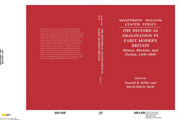Book contents
- Frontmatter
- Contents
- Preface
- WOODROW WILSON CENTER SERIES
- 1 Introduction
- 2 Precept, example, and truth: Degory Wheare and the ars historica
- 3 Truth, lies, and fiction in sixteenth-century Protestant historiography
- 4 Thomas More and the English Renaissance: History and fiction in Utopia
- 5 Little Crosby and the horizons of early modern historical culture
- 6 Murder in Faversham: Holinshed's impertinent history
- 7 Foul, his wife, the mayor, and Foul's mare: The power of anecdote in Tudor historiography
- 8 Experience, truth, and natural history in early English gardening books
- 9 Thomas Hobbes's Machiavellian moments
- 10 The background of Hobbes's Behemoth
- 11 Leviathan, mythic history, and national historiography
- 12 Protesting fiction, constructing history
- 13 Adam Smith and the history of private life: Social and sentimental narratives in eighteenth-century historiography
- 14 Contemplative heroes and Gibbon's historical imagination
- Contributors
- Index
- Titles in the series
Preface
Published online by Cambridge University Press: 04 August 2010
- Frontmatter
- Contents
- Preface
- WOODROW WILSON CENTER SERIES
- 1 Introduction
- 2 Precept, example, and truth: Degory Wheare and the ars historica
- 3 Truth, lies, and fiction in sixteenth-century Protestant historiography
- 4 Thomas More and the English Renaissance: History and fiction in Utopia
- 5 Little Crosby and the horizons of early modern historical culture
- 6 Murder in Faversham: Holinshed's impertinent history
- 7 Foul, his wife, the mayor, and Foul's mare: The power of anecdote in Tudor historiography
- 8 Experience, truth, and natural history in early English gardening books
- 9 Thomas Hobbes's Machiavellian moments
- 10 The background of Hobbes's Behemoth
- 11 Leviathan, mythic history, and national historiography
- 12 Protesting fiction, constructing history
- 13 Adam Smith and the history of private life: Social and sentimental narratives in eighteenth-century historiography
- 14 Contemplative heroes and Gibbon's historical imagination
- Contributors
- Index
- Titles in the series
Summary
Imagination in its highest form is said to be the creative faculty of the mind, the department engaged in framing new images and conceptions, things and ideas hitherto unknown and previously nonexistent. As such, it has always been connected with the arts, verbal as well as visual. Imagination lives in the realm of fancy and of fiction, the antithesis of observable facts and empirically testable propositions. In a more general sense, however, the word “imagination” refers to the capacity of the mind to form images or concepts of what is not actually present to the senses and to evoke their relations with one another. As such, it can bring into view remote, absent, or previously occurring events as well as purely imaginary ones. In this meaning, it enjoys an intimate connection with the idea of memory, and has a close tie to the work of historians and to the purposes and practices of historical writing. History of necessity deals with the need to make present what has left only traces or remains by which it can be known. As a discipline concerned with recovering the past, history cannot but come to terms with the limits of representation this process entails; so despite its prosaic form, it has enjoyed an affinity, and sometimes an intense sibling rivalry, with poetry, its sister genre, and one of imagination's main fields of play.
This kinship was a subject of particular interest and concern in the early modern period, an era in which strenuous efforts were being made on many fronts – in the institutions of church and state as well as in the various arts and sciences and in popular culture – to recover and emulate the truths and traditions of the past and to command time-bound processes of change or overcome them.
- Type
- Chapter
- Information
- The Historical Imagination in Early Modern BritainHistory, Rhetoric, and Fiction, 1500–1800, pp. ix - xiiPublisher: Cambridge University PressPrint publication year: 1997



